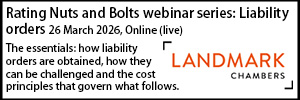When are statistics ‘held’ for the EIA/ FOIA?
- Details
The First-Tier Tribunal has given further guidance on requests made pursuant to FOIA and/ or the Environmental Information Regulations 2004 (“EIR”) for statistics. Conor Monighan examines the ruling.
In Roberts v Information Commissioner [2025] UKFTT 111 (GRC), Mr Roberts had made a request under the EIR for a map or list of roads which were due to have their speed limit reduced to 20 mph. He noted that a website called DataMapWales showed the information in relation to other councils, but the information for the Swansea Council area was absent.
The council responded to Mr Roberts’ request by stating it lacked the relevant information.
The ICO agreed with the council. The Commissioner noted that the website was operated by the Welsh Government. The fact that other councils had provided the data didn’t mean Swansea possessed the relevant information.
FTT judgment
The First Tier Tribunal (“FTT”) disagreed and found that Swansea Council did, in fact, hold the requested information. The Tribunal noted:
- The council had maps showing street-lit roads where a 20-mph limit applied by default.
- It held records of Traffic Regulation Orders that altered speed limits.
- These elements allowed the creation of the requested list or map without generating new information.
Therefore the council must issue a fresh response within 35 days and either provide the information or issue a refusal notice with justification.
Legal reasoning
When considering whether the council ‘held’ the relevant information for the purposes of the EIR, the FTT applied a similar approach to information requests under FOIA. As noted in Home Office v IC and Cobain (EA/2012/0129), public authorities are frequently asked to provide statistics via FOIA. The key question is whether the statistics sought can be extracted from existing records with reasonable effort.
In this case the FTT concluded:
- The question of whether the statistics were ‘held’ for the purposes of the EIR/ FOIA depended upon the complexity of the operations needed to change the raw data into usable statistics.
- In this case, compiling a list of roads did not require significant skill or judgment. Therefore the information was ‘held’ under the EIR.
- Although time and resource constraints might make the request unreasonable, that would fall under the EIR’s ‘manifestly unreasonable request’ provision rather simply asserting that the data was not held.
The Tribunal also determined that when a public authority initially denies holding requested information but is later found to possess it, the authority can subsequently invoke exemptions to avoid providing the information. This principle is not limited to FOIA but also applies to the EIR.
Conor Monighan is a barrister at 5 Essex Chambers.
Must read
Sponsored articles
Walker Morris supports Tower Hamlets Council in first known Remediation Contribution Order application issued by local authority
Unlocking legal talent
Legal Director - Government and Public Sector
Legal Officer
Senior Solicitor - Property
Locums
Poll
05-03-2026 5:00 pm
21-04-2026
01-07-2026 11:00 am












































